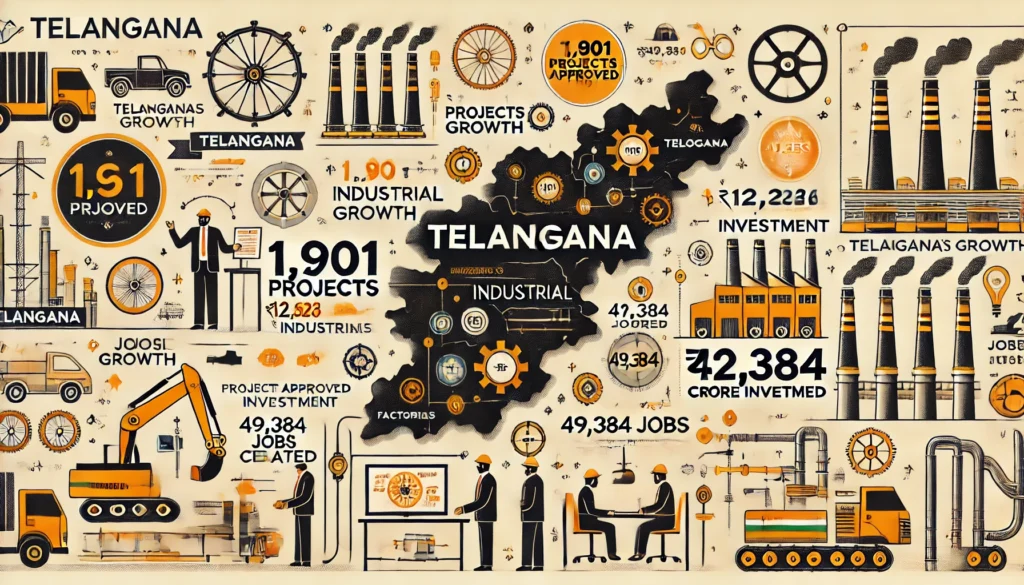The Government of India has implemented several initiatives to promote domestic manufacturing of electric vehicles (EVs) and reduce the country’s dependence on imports, focusing on incentives, infrastructure development, and policy reforms.
Key Initiatives to Boost Domestic EV Manufacturing:
- Production Linked Incentive (PLI) Scheme for Automobiles and Auto Components:
- Approved with a budgetary outlay of ₹25,938 crore for five years.
- Aims to boost the manufacturing of Advanced Automotive Technology (AAT) products and attract investments across the automotive value chain.
- Production Linked Incentive (PLI) Scheme for Advanced Chemistry Cell (ACC) Manufacturing:
- Approved on May 12, 2021, to reduce battery costs and promote local production of lithium-ion and other advanced batteries.
- Helps bring down the cost of EVs by reducing battery prices.
- FAME India Scheme Phase-II (Faster Adoption and Manufacturing of Electric Vehicles):
- Launched with a budgetary outlay of ₹10,000 crore for five years (from April 1, 2019).
- Focuses on supporting the electrification of public and shared transportation, providing subsidies for:
- 7,090 e-Buses
- 5 lakh e-3 Wheelers
- 55,000 e-4 Wheeler Passenger Cars
- 10 lakh e-2 Wheelers
- Supports charging infrastructure development to alleviate range anxiety among EV users.
- Phased Manufacturing Programme (PMP):
- Introduced under FAME India Phase-II to promote domestic manufacturing of EV parts and increase value addition within the country.
Financial Incentives and Tax Reductions:
- Incentives for Buyers:
- Under FAME Phase-II, buyers receive upfront reductions in the purchase price of EVs.
- Incentive is linked to battery capacity:
- ₹10,000 per kWh for e-2 Wheelers (up to 15% of vehicle cost).
- ₹10,000 per kWh for e-3 Wheelers (up to 20% of vehicle cost).
- GST Reductions:
- GST on electric vehicles reduced from 12% to 5%.
- GST on EV chargers/charging stations reduced from 18% to 5%.
- Road Tax Exemptions:
- Green license plates issued for battery-operated vehicles.
- States have been advised to waive road tax on EVs to reduce initial purchase costs.
Public Charging Infrastructure Development:
- Ministry of Power Guidelines:
- Issued guidelines to develop EV charging infrastructure and ensure affordable tariffs for public EV charging stations.
- Features of the guidelines include:
- Affordable Tariff: Special EV tariffs with single-part pricing applicable until March 31, 2025.
- Revenue Sharing Model: Land provided at promotional rates for charging stations.
- Service Charge Ceiling: Capped service charges for slow AC and DC fast charging:
- ₹2.50 to ₹3.50 per unit for slow charging.
- ₹10 to ₹12 per unit for DC fast charging.
- Timely Electricity Connections: Public Charging Stations to receive connections within stipulated timelines.
- Cost of Supply to Charging Stations:
- DISCOMs to supply electricity to public EV charging stations at 0.8 times the Average Cost of Supply (ACoS) during solar hours and 1.2 times ACoS during non-solar hours.
Promoting EV Adoption:
- Green License Plates:
- Introduced by Ministry of Road Transport & Highways (MoRTH) for battery-operated vehicles.
- Helps identify and exempt EVs from permit requirements.
- State-level Road Tax Waivers:
- MoRTH has advised states to waive road taxes on EVs to reduce their upfront cost.
- Regular Assessments:
- The Ministry of Heavy Industries conducts periodic assessments of electric two-wheelers (e-2Ws) and electric three-wheelers (e-3Ws) to evaluate the existing charging infrastructure and manufacturing capabilities.
Conclusion:
The Government of India has launched several schemes and initiatives to promote the domestic manufacturing of EVs, reduce import dependency, and create a self-reliant EV ecosystem. These measures not only support the Make in India initiative but also contribute to achieving India’s climate goals by encouraging the adoption of sustainable and clean mobility solutions.
Article Source and Credit :- PIB India
